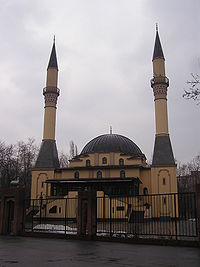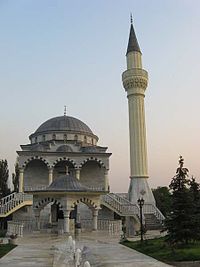- Islam in Ukraine
-
Part of a series on
Islam by countryThe AmericasThe majority of Muslims in Ukraine are ethnic Crimean Tatars and live in the Crimean peninsula. According to a Pew Forum study, the Muslim population in Ukraine is 393,000[1], while according to the Spiritual Administration of Muslims of Ukraine there are 2 million Muslims in Ukraine.[2]
Contents
History of Muslims in Ukraine
 Ahat Jami Mosque in Donetsk.
Ahat Jami Mosque in Donetsk.
While ethnic Ukrainians are predominantly Orthodox and Uniate Christians, Muslims have lived in the territory that makes up modern Ukraine today for centuries. Muslim settlement in the country is concentrated in the country's southern half, particularly in Crimea, although there were colonies of Lipka Tatars in other regions such as Volhynia and Podolia.
The Crimean Khanate was established by the Crimean Tatars in the 15th century. These people were formed from the Turkic-speaking descendants of both Turkic and non-Turkic peoples who had settled in Eastern Europe as early as the 7th century.
The Khanate soon lost its sovereignty and fell under the influence of the Ottoman Empire on behalf of which it was ruled by the local tributary rulers with significant degree of autonomy. In 15th-18th centuries, Crimean Tatars frequently raided Eastern Slavic lands to capture slaves, enslaving an estimated 3 million people, predominantly Ukrainians. The influence of Russia in the area, initially small, was growing slowly and in the late 18th century after the series of Russo-Turkish Wars the territory was annexed by the Russian Empire.
The Crimean Tatars were Sunnis and the Mufti was regarded as the highest religious figure. All communities were led by and represented before others by local imams.
The Crimean Khanate had Bakhchisaray as its capital. In the 18th century, when it was conquered by Russia, there were at least 18 mosques in the capital and several madrassas. The Russian Empire began persecuting the Muslim population and nearly 160,000 Tatars were forced to leave Crimea.
For the Muslims who stayed, there were conflicts in ideology among those who adhered to conservative form of religion, the moderates, and those who subscribed to liberal and Western ideology.
Ukrainian Muslims in the 20th century
At the time of the Russian Revolution, Muslims were one third of population of Crimea. Nearly all major cities in Crimea had a significant Muslim population.
Crimean Muslims were subjected to mass deportation in 1944 when Joseph Stalin accused them of collaborating with the Nazi Germany. Nearly 200,000 Crimean Tatars were deported to Central Asia, mainly Uzbekistan but also to Kazakhstan and some regions of Russian SFSR. The main deportation occurred on May 18, 1944. It is estimated that about 45% of all Crimean Muslims died in 1944–1945 from hunger and disease.[citation needed] The property and territory abandoned by Crimean Tatars were appropriated by the mostly ethnic Russians who were resettled by the Soviet authorities. This led to demographic changes in Ukraine with huge impact in the future. Although a 1967 Soviet decree removed the charges against Crimean Tatars, the Soviet government did nothing to facilitate their resettlement in Crimea and to make reparations for lost lives and confiscated property. The repatriation of Crimean Tatars to their homeland began only in 1989.
Ukrainian Muslims today
 Sultan Suleiman Mosque in Mariupol.
Sultan Suleiman Mosque in Mariupol.
Since Ukrainian independence (1991), more Crimean Tatars have returned to Crimea than during Soviet era. The Muslims are divided into various ethnic groups but the majority are of Tatar origin, of one particular clan or other. There have also been settlement by Chechen refugees in Crimea and other parts of Ukraine but the proportion is not significant.
Muslims have formed three structures for running their affairs. These are:
- The Spiritual Direction of the Muslims of Ukraine
- The Spiritual Center of the Muslim Communities
- Spiritual Direction of the Muslims of Crimea
Most Ukrainian Muslims affiliate to these organizations which help them join mainstream Islamic anbd Ukrainian daily life. Most Muslims have been trying to form a party to have a united voice in Politics, a so-called Muslim Congress, but so far it has not been achieved. Muslims have formed several charitable organizations helping both the Muslim and non-Muslim communities. These mainly include CAAR Foundation, Al-Bushra, and Life after Chornobyl. There is also the Interregional Association of Public Organizations, Arraid which has often gained world attention due to its dedication.
Statistics
Muslims in Ukraine have 445 communities, 433 ministers, 160 mosques with many more mosques being built.[3]
In Crimea the Ukrainian Muslims make up to 12% of the population. At least 30 Ukrainian Muslim communities work without official registration (there are nearly 360 registered communities or organizations). Others groups include Chechens or Caucasian immigrants or settlers, as well as a few Afghans. Major languages are Tatar, Turkish and Caucasian languages such as Chechen or Avar. But all communities speak Russian and many also speak the Ukrainian language.
Ukrainian translation of the Qur'an and Sunnah
A few attempts to render the Holy Book of Islam into Ukrainian were processed during the last centuries. Since the first non-direct (source?) translation of Abranchak-Lysynecki (Lviv, 1915), few partial translations were published (Yarema Polotniuk - Vsesvit Journal, 1990), Valeriy Rybalkin ("Stylos", 2002) and Mykhaylo Yakubovych. Among the large Sunnah corpus the only translation of "Forthy hadeeth an-Nawawe" is known (Alexandria, 2006, by M. Yakubovych).
References
See also
- Crimean Khanate
- Crimean Tatars
- Crimea
- Ochakov
- Mustafa Abdülcemil Qırımoğlu
- Islam in Russia
- Islam in Belarus
- Islam in Poland
External links
- http://gazeta.arraid.org (Ukrainean Muslims Newspaper ARRAID)
- http://www.islam.in.ua (News & publicistic site about Islam & Muslim in Ukraine)
- http://www.islamyat.org (Official website) Religious Administration of Ukraine
- Crimean Tatar Internet Resources
- Crimean Tatars Short History
- Ukrainian translations of the Meanings of the Glorious Qur'an: Problems and Prospects. An article by Mykhaylo Yakubovych
- Yakubovych, Mykhaylo 'Islam and Muslims in Contemporary Ukraine: Common Backgrounds, Different Images', Religion, State and Society, September 2010, 38:3, 291 - 304
Islam in Europe Sovereign
states- Albania
- Andorra
- Armenia
- Austria
- Azerbaijan
- Belarus
- Belgium
- Bosnia and Herzegovina
- Bulgaria
- Croatia
- Cyprus
- Czech Republic
- Denmark
- Estonia
- Finland
- France
- Georgia
- Germany
- Greece
- Hungary
- Iceland
- Ireland
- Italy
- Kazakhstan
- Latvia
- Liechtenstein
- Lithuania
- Luxembourg
- Macedonia
- Malta
- Moldova
- Monaco
- Montenegro
- Netherlands
- Norway
- Poland
- Portugal
- Romania
- Russia
- San Marino
- Serbia
- Slovakia
- Slovenia
- Spain
- Sweden
- Switzerland
- Turkey
- Ukraine
- United Kingdom
- (England
- Northern Ireland
- Scotland
- Wales)
- Vatican City
States with limited
recognition- Abkhazia
- Kosovo
- Nagorno-Karabakh
- Northern Cyprus
- South Ossetia
- Transnistria
Dependencies
and other territories- Åland
- Faroe Islands
- Gibraltar
- Guernsey
- Jan Mayen
- Jersey
- Isle of Man
- Svalbard
Other entities Categories:
Wikimedia Foundation. 2010.
